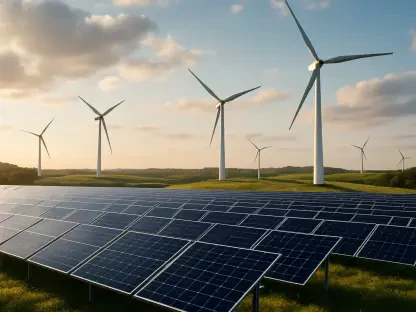In a rapidly changing political climate, the future of clean energy initiatives and associated job opportunities may hang in the balance. As legislative bodies deliberate over potential budget cuts, communities across the United States face looming uncertainty about the sustainability of recent progress toward a cleaner future.
The clean energy sector has steadily made its mark on the United States’ economic landscape, surprising many with its significant contributions to employment and economic growth. A less commonly acknowledged truth is that, according to industry reports, investment in renewable energy has created jobs at a rate four times higher than traditionally fossil-fueled industries. This intriguing revelation is put at risk as congressional discussions turn to evaluations of the Inflation Reduction Act (IRA) and its massive projected cost. Amidst these budget revisions, districts benefiting from clean energy investment may soon confront stark job losses.
The Budgetary Battle: Background and Broader Significance
The Inflation Reduction Act, a landmark legislative achievement, projects expenditures ranging from $780 billion to $2 trillion in its initial decade. This initiative holds a pivotal role in boosting clean energy advancements and curtailing greenhouse gas emissions. Enthusiasts praise its contributions to environmental protection, while critics view its financial implications with scrutiny, feeding ongoing debates about federal expenditure priorities and the pressing urgency of climate change.
Public apprehension regarding both fiscal responsibility and effective climate action is evident. As national leaders push for strategies addressing climate change, some argue that federal financial commitments to the IRA could strain already stretched resources. Balancing environmental aspirations with budgetary constraints poses a challenge fraught with conflicting interests and complex questions of priority.
The Political Landscape: Divergent Perspectives
The IRA’s future finds itself squarely at the heart of partisan contention. Among Republicans, the IRA represents a significant target for potential budget cuts given its sizable federal impact. Republican calls for curbing government spending demonstrate a cautious approach toward budget allocations, despite some districts benefiting substantially from the act.
Contrary to Republican aspirations, Democrats emphasize the negative repercussions that budget cuts could wreak on clean energy development and related consumer costs. Democratic lawmakers urge preserving the IRA’s provisions, which they suggest are integral to the nation’s energy future. This dynamic offers an intriguing paradox, with Republican districts receiving IRA funding yet contemplating cuts that may undermine this very financial support.
Insights from Debates: Perspectives and Consequences
Congressional hearings on budget adjustments have shone a light on both sides of the aisle, illustrating variances in approach and priority. Advocates like Rep. Claudia Tenney from New York tout nuclear power’s imperative role, insisting its issues deserve distinct consideration. Nuclear energy, as specified, constitutes a substantial portion of her state’s electric grid, necessitating strategic emphasis on its preservation.
Meanwhile, apprehensions among Democrats focus on maintaining IRA credits until comprehensive impact analysis is conducted. Rep. Kathy Castor advocated for a deliberate evaluation of policy outcomes, suggesting that such impactful legislative alterations should not hastily proceed without thorough consideration. Other figures, including Rep. Alexandria Ocasio-Cortez, echo sentiments about transparency and substantive examination of potential economic effects.
Expert Opinions and Anecdotal Evidence
Experts weigh in on foreseeable consequences attributed to IRA adjustments, with some projecting economic setbacks from premature credit phaseouts. Clean energy investments, held in high esteem for their job creation within varied regions, face real peril if government withdrawal occurs. Practicable evidence from Republican-majority states benefiting from IRA-generated employment supports arguments for sustained investment.
Conversely, critiques of IRA inefficiencies ring out across political lines. Rep. Buddy Carter’s frank assessment articulates concerns of potential mismanagement within IRA execution, advocating reevaluation of its resource allocation methods. The juxtaposition of perceived shortcomings and economic progress created by these investments underscores the intricacies of the wider legislative debate.
Strategies and Solutions: A Path Forward
Amidst fiscal pressures and competing priorities, actionable paths may bridge the gap between financial propriety and steadfast clean energy support. Establishing unbiased frameworks for evaluating energy policy implications offers a noteworthy way forward. As decisions loom large, informed and meticulous inquiry becomes paramount to understanding the real-world ramifications of these choices.
Moreover, promoting informed dialogue between legislative bodies and stakeholders expands the potential for innovative strategies securing job growth while acknowledging budget boundaries. Solutions facilitating evidence-based policymaking and productive compromise may arise as a transformative step toward harmonizing the economic vitality of the clean energy sector with broader financial imperatives.
Past debates surrounding the IRA symbolized a crossroads for both clean energy and fiscal policy. Figuring out a responsible path forward required balancing government budget constraints against ongoing commitments to environmental goals and regional job markets. While the discussions revealed stark ideological differences, the outcome highlighted opportunities for collaboration between policymakers and experts to achieve sustainable solutions.









